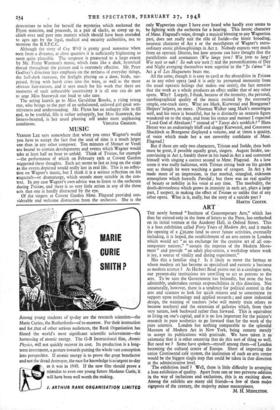MUSIC
VERNON LEE says somewhere that when you enter Wagner's world you have to accept the fact that the unit of time is a much larger one than in any other composer. Ten minutes of Mozart or Verdi are bound to contain developments and events which Wagner would take at least half an hour to unfold. Think of Tristan, for example —the performance of which on February nth at Covent Garden suggested these thoughts. Each act seems to last as long on the stage as the events depicted would really last in real life. This is no reflec- tion on Wagner's music, but I think it is a serious reflection on his atagecraft—or dramaturgy, which sounds more suitable in the con- text. In any case Wagner's own advice, was to listen to the orchestra during Tristan, and there is -so very little action in any of the three acts that one is hardly distracted by the eye.
Of the singers at Covent Garden Mme. Flagstad provided con- siderable and welcome distraction from the orchestra. She is the
only Wagnerian singer I have ever heard who hardly ever seems to be fighting with the orchestra for a hearing. This heroic character of Mme. Flagstad's voice, though a musical blessing to any Wagnerian part, does not really suit' the role of Isolde—the bitter brooding, neurotic character of Act i or the mouthpiece of Wagner's extra- ordinary erotic philosophisings in Act 2. Nobody expects very much from an operatic libretto, but how anyon' e can have thought that the parallelisms and assonances (Wie Lange fern! Wie fern so long ! Wie welt so nah! So nah wie weit!) and the personifications of Day and Night avenging themselves were superior to the "le ectime" in Act 4 of Les Huguenots beats me.. All the same, though it is easy to cavil at the absurdities in Tristan as in any other opera (and it is only its presumed immunity from, the usual operatic failings that makes one insist),-the fact remains that the work as a whole produces an effect unlike that of any other opera. Why? Largely, I think, because of the intensity, the personal, autobiographical quality of the music assisted by the extremely simple, one-track story. What are Mark, Kurwenal and Brangaene? Helpers' helpers, no more. (Norman Walker sang Mark's monologue well, and his voice is beautiful, but he is distinctly an oratorio figure wandered on to the stage, and from his stance and manner I expected " Lord God of Abraham! " instead of " Tatest du's wirklich?" Hans Hotter was an endearingly bluff and shaggy Kurwenal, and Constance Shacklock as Brangaene displayed a volume, and at times a quality, of voice which made her a not unworthy confidante of Mme. Flagstad.) But if there are only two characters, Tristan and Isolde, then both must be great, if possible equally great, singers. August Seider, un- convincing in Act t, frankly threw in his hand-in Act 2 and contented himself with singing a correct second to Mme. Flagstad. As a love scene it was really ludicrous, with 'Tristan sitting back on his garden seat as though he were watching a game of croquet. In Act 3 he made more of an impression, in that morbid, strangled, sickroom atmosphere which foretells Parsifal ; but there was no real quality of beauty or nobility in his voice at any time. The morbidity, the death-devotedness which grows in intensity in each act, plays a large part, I suspect, in making the effect of Tristan so unlike that of any other opera. What is it, really, but the story of a suicide pact ?
MARTIN COOPER.


































 Previous page
Previous page